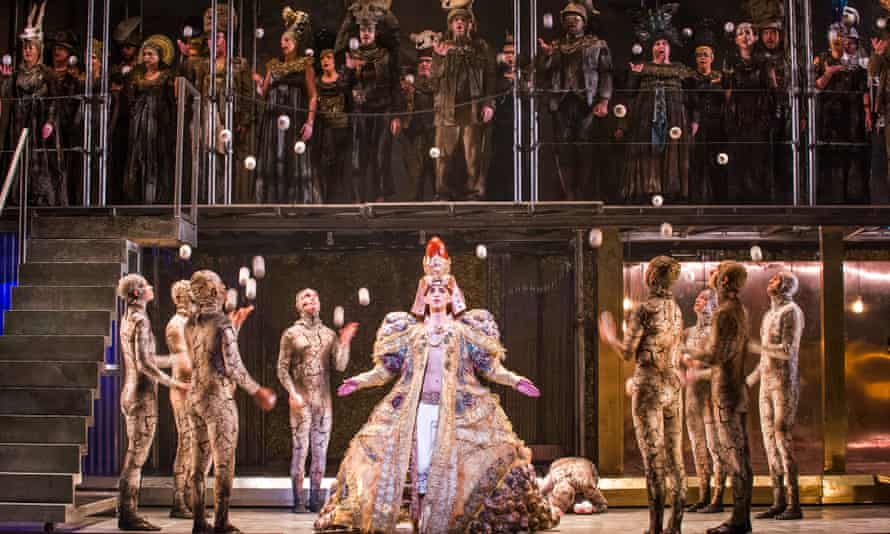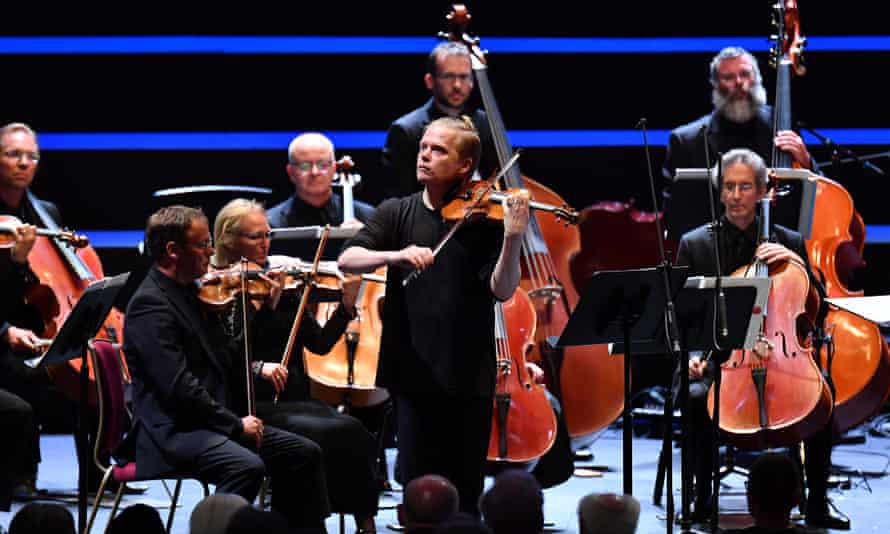When Will Abell Be Conducting the Bbc Orchestra Again
T he plan announced today for this summertime's BBC Proms makes much of its return to business every bit normal. There are a full eight weeks of concerts in the Imperial Albert Hall this summer, after ii years of severe restrictions – in 2020 just a fortnight of live music was livestreamed from an empty hall; final year'south season was also truncated and given virtually entirely past British-based orchestras. But it's back to the usual formula this year, with a big-calibration choral work – Verdi's Requiem – to launch the jamboree on xv July, and a traditional Terminal Night conducted by Dalia Stasevska, with cellist Sheku Kanneh-Mason and soprano Lise Davidsen as the soloists.
Just in other, less positive, ways things are just a fleck besides much like they were in 2019, when the flavor seemed lacking in adventure and overcautious in its approach. There's very little feeling of enterprise and imagination in the 2022 concerts either. Programmes seem to accept been planned in a distinctly take chances-averse way, with attending devoted to making sure that every politically correct box is safely ticked, with the full range of family concerts, gaming and relaxed proms, but possibly not enough thought given to what might be genuinely challenging or audacious in what however insists on describing itself equally the biggest classical music festival in the earth.
The one major and welcome innovation comes in the complementary Monday series of lunchtime chamber music, which in recent years has taken identify in London's Cadogan Hall. This time the series of eight concerts is dispersed around the country, with recitals taking place from Truro to Glasgow, Belfast to Battersea. And for one evening concert the Proms deserts the Royal Albert Hall for an excursion to the Printworks in Rotherhithe, where English language National Opera volition nowadays an "operatic spectacle" conceived by counter-tenor Anthony Roth Costanzo that mixes Handel arias with extracts from Philip Glass's operas and song cycles (3 September).

The twelvemonth's significant musical anniversaries of form become their due attending. The 150th anniversary of Vaughan Williams' nascence is marked not with a complete series of the symphonies but with a more wide-ranging selection of his works including the rarely heard tuba and oboe concertos. The bicentenary of César Franck, and the centenaries of George Walker, Doreen Carwithen and Iannis Xenakis are duly acknowledged, though in keeping with an approach that seems to worry nearly giving the audience anything that is as well "difficult" or rebarbative, simply one of the pieces by Xenakis is at all substantial. Ethel Smyth is generously represented besides, not considering there is any item ceremony to mark, but mainly, one suspects, because Glyndebourne is bringing its new production of Smyth's The Wreckers to the Albert Hall, providing a handy focus for a thematic thread.
Though at that place is no longer the parade of the world's orchestral keen and good that used to be a feature of the final weeks of Proms seasons, in that location is at least this year a healthy representation of orchestras from overseas, including the newly formed Ukrainian Freedom Orchestra (31 July), the Oslo Combo (12 Baronial), and the Philadelphia Orchestra (viii and ix September).
In that location is the usual scattering of specially commissioned pieces and local premieres, but what's missing are the special events, the kind of concerts that simply the Proms, with all the resources of the BBC and the flexible space of the Albert Hall could afford to put on, whether that is a rarely performed opera, massive orchestral score or an electro-audio-visual novelty. That kind of ambition seems to be nonexistent in planning the Proms nowadays, and it'south very depressing.

Andrew Clement's Proms highlights
Cassandra Miller premiere (18 July)
The first of the yr'south Proms commissions promises to exist one of the virtually interesting. Miller is the latest composer to write a large-scale work for the viola player Lawrence Power, who introduces her concerto with the BBC Philharmonic.
The Site of an Investigation (28 July)
Jennifer Walshe's deconstruction of a symphony receives its London premiere, in an unlikely pairing with Brahms' German Requiem; Ilan Volkov conducts the BBC Scottish Symphony Orchestra.
Il Tabarro (30 July)
A concert performance of Puccini'due south tragic ane-acter, with the Hallé Orchestra conducted past Mark Elderberry, and Natalya Romaniw, George Gagnidze and Ivan Gyngazov as the protagonists.
Prague Panoramas (5 August)
Julian Anderson's 2nd symphony, inspired by photographs of the Czech majuscule in the 1940s, is premiered by the BBC Symphony Orchestra, under Semyon Bychkov.
Australian Earth Orchestra (23 August)
Zubin Mehta makes an all-likewise-rare London appearance conducting a ring drawn from 50 of the earth's leading orchestra in a programme of Webern, Debussy and Brahms.
Märchentänze (26 Baronial)
Pekka Kuusisto is the soloist in Thomas Adès's slice for violin and orchestra, based on English language folk tunes.
This New Dissonance (xxx August)
The BBC celebrates its own 100th anniversary with a multimedia commission from the band Public Service Dissemination, using audio and visual material from the corporation'due south archives.
The Dream of Gerontius (31 Baronial)
Allan Clayton follows his huge success in the title role of the Royal Opera's new product of Peter Grimes, by taking the leading role in Elgar's masterpiece; Edward Gardner conducts the London Philharmonic Choir and Orchestra, Jamie Barton and James Platt are the other soloists.
Berliner Philharmoniker (3 and 4 September)
Kirill Petrenko brings his great orchestra to London for two concerts; the first is devoted to a single piece of work, Mahler's Seventh Symphony, the second pairs Schnittke's Viola Concerto with Shostakovich's tenth Symphony.
Missa Solemnis (seven September)
John Eliot Gardiner conducts the Monteverdi Choir and the period-musical instrument Orchestre Révolutionnaire et Romantique, with soloists Lucy Crowe, Ann Hallenberg, Giovanni Sala and William Thomas, in Beethoven's late choral masterpiece.
Source: https://www.theguardian.com/music/2022/apr/26/proms-2022-back-to-normal-but-why-settle-for-normal
0 Response to "When Will Abell Be Conducting the Bbc Orchestra Again"
Post a Comment